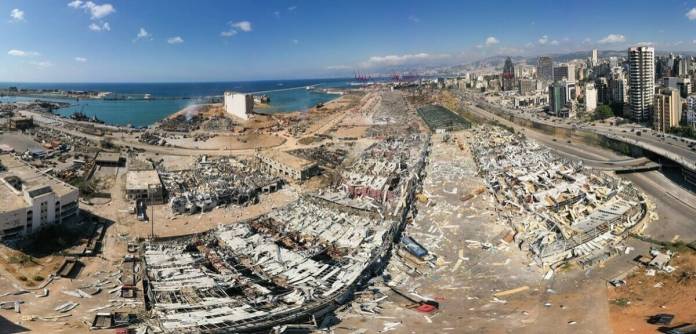Even before last week’s devastating explosion at Beirut’s port, the negligence of Lebanese officials and their failure to protect the Lebanese people had plunged the country into a cycle of debts, economic collapse, a deteriorating exchange rate, and the impoverishment of the middle classes.
To help try and find a solution, finance and banking expert, Dr. Nicolas Sheikhani, prepared a paper to aid negotiations with the International Monetary Fund about the details of financial and reform plans required to solve the crisis of bank depositors. The plan aimed to maintain confidence in the Lebanese banking and financial sector and to distribute the losses equitably among all parties according to their responsibility in the economic crisis. It met with positive responses from various stakeholders, with Sheikhani expecting about 80% of it to be adopted. Unfortunately, it had not been approved when the explosion hit Beirut port. The ensuing resignation of the government likely means further delay.
Sheikhani believes that a solution to the financial crisis is still available, but time is running out, and there is an urgent need to form a government with exceptional powers to launch a rescue operation.
“The flow of aid from abroad helps in the foreseeable future only to stabilize the exchange rate of the pound at levels below 8,000 pounds to the dollar, but this matter will not last for long and is not a permanent solution,” he explained in an interview with Forbes Middle East.
Looking at the numbers, the public debt before the explosion was equivalent to a total value of about $95 billion. An estimated $15 billion more could now be added, with $1 billion lost in the destruction of the port and its surroundings. The blast affected about 40% of Beirut’s homes, with tens of thousands damaged, and more than 25,000 companies. The port, which facilitates about 70% of Lebanon’s international trade, was destroyed. This is in addition to the killing of more than 170 people, while about 40 remain missing. More than 6,000 were injured. The losses caused by the explosion are huge for the economy and for the Lebanese people.
“Its full evaluation needs a long period, but it will undoubtedly range between $10 million and $15 billion, and this will push the GDP to decline further,” says Sheikhani. “I remember here that the government plan had set the output at $26 billion. Still, our study showed before the explosion that it would range between $30 billion and $35 billion. After the accident, in my opinion, it could decline to $25 billion. The debt to GDP may exceed 300% after accounting for losses—a ratio that no country in the world has ever reached. Therefore, the $250 million in aid is not enough.”
Dr. Sheikhani maintains that the plan he prepared previously is still valid no matter how high the losses end up being. The final number is not the problem he insists, but rather the start of the solution.

